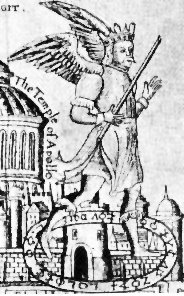| Bladud | |
|---|---|
 Bladud from the Genealogical Chronicle of the Kings of England to Edward IV (c. 1461) | |
| King of Britain | |
| Predecessor | Rud Hud Hudibras |
| Successor | Leir |
| Issue | Leir |
| Father | Rud Hud Hudibras |

Bladud or Blaiddyd[a] is a legendary king of the Britons, although there is no historical evidence for his existence. He is first mentioned in Geoffrey of Monmouth's Historia Regum Britanniae (c. 1136), which describes him as the son of King Rud Hud Hudibras, and the tenth ruler in line from the first king, Brutus, saying Bladud was contemporaneous with the biblical prophet Elijah (9th century BC).
A Bleydiud son of Caratauc is mentioned in the Welsh Harley MS 3859 genealogies (in the British Library), suggesting to some that Geoffrey misinterpreted a scrap of Welsh genealogy (such as the Harleian genealogies itself or a related text).[1] The Welsh form of the name is given as Blaiddyd in manuscripts of the Brut Tysilio (Welsh translations of Geoffrey's Historia).[2] The meaning of the name is "Wolf-lord" (Welsh blaidd "wolf" + iudd "lord").[3][4] In the text he is said to have founded the city of Bath. He was succeeded by his son Leir (the Shakespearean King Lear).
The tale of Bladud was later embellished by other authors, such as John Hardyng and John Higgins, writing in the fifteenth and sixteenth centuries.[5]
- ^ Hutson, Eugene, British personal names in the Historia regum Britanniae, part of series University of California Publications in English, Volume 5, no. 1, University of California Press, 1940, p. 12.
- ^ Jones, Mary. "Brut Tysilio" Archived 9 April 2012 at the Wayback Machine, maryjones.us. Retrieved 21 July 2009.
- ^ Williams, Ifor (1980) [1972], The Beginnings of Welsh Poetry: studies. Cardiff University of Wales Press, p. 160 Ifor Willimas here comments on a different personage, i.e., Bleiddud, Lord of Tenby in the poem Etmic Dinbych or 'Praise of Tenby'. The later shift in spelling to Bleiddydd is also discussed.
- ^ Bladud signified "wolf-fighter" accord. to Sayce, A. H. (1890) " The Legend of King Bladud" Y Cymmrodor 10: 214
- ^ Borsay, Peter (2000). The image of Georgian Bath, 1700-2000: towns, heritage, and history. Oxford, England: Oxford University Press. p. 50. ISBN 0-19-820265-2.